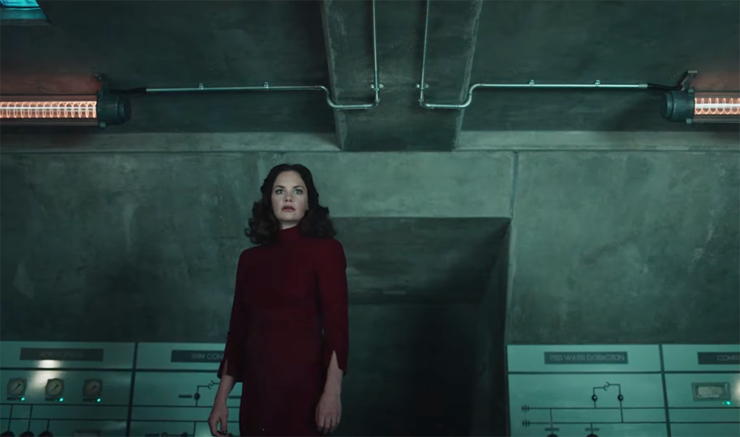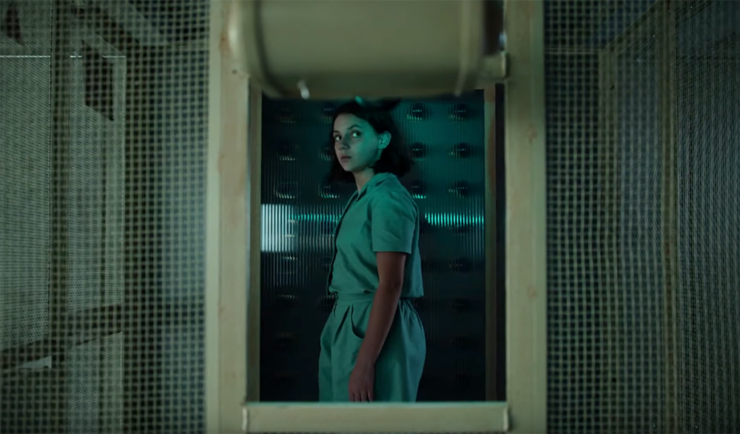We open with a procession through the grim Magisterium research laboratory/concentration camp, Bolvangar. Lyra finally sees Roger across the dining hall but can only communicate with him through their daemons. He seems much changed by his imprisonment.
A girl named Bridget McGinn (Eva Jazani) is called away by Dr Cooper and Sister Clara. On the way to Bridget’s intercision—the terrible process by which daemons are spliced from their humans—Sister Clara experiences a sudden flash of what we later learn is her own intercision.
Lyra is examined by Dr Rendal (Amit Shah), who is curious as to what Lyra knows about dust and nervous about her accusations that this is some kind of “children chop shop.” In the yard, Lyra incites a snowball fight, allowing her and Roger to escape. They find their way to the episode’s titular daemon cages, where sick, intercised daemons languish catatonically. But if the daemons are alive, Roger asks, where are the children? They find them soon enough—broken, zombified husks, chanting in unison, their heads shaved like the victims of Nazi concentration camps. Bridget is among them.
While Lyra and one of her fellow prisoners, Annie (Raffiella Chapman) plan an escape, Rendal and Cooper drink, dreading the arrival of Mrs Coulter. While Cooper is nervous about their lack of progress, Rendal is afraid that, if they fail in their experiment, they will have taken part in the torture and murder of children for no reason at all.
In the briefest of interludes in our world, Will watches a video of his father John Parry (our first real look at Sherlock and Fleabag’s Andrew Scott) being interviewed, before padding through the house. Outside, Boreal’s hunter and tech monitor the Parry household, waiting for an opportune moment to detect evidence of John Parry’s window between worlds.
Mrs Coulter arrives at Bolvangar and Lyra is able to avoid detection by hiding underneath one of the beds, while Lee and the gyptians make their way towards the station over a perilous mountain range.
Lyra’s plan encounters a snag when Dr Cooper calls for her intercision. Forced into a cage within a huge, magnetically charged device, Lyra calls out for Mrs Coulter—eventually screaming out “Mother!” Mrs Coulter puts a stop to it just in time, sparing Lyra a fate worse than death.
In her private quarters, Mrs Coulter comes clean about her parentage and says she gave Lyra up because it wouldn’t have been good for either of them. She tells Lyra that intercision is a step towards a perfect world where people live free of sin and that the treatment must be performed before the subject hits puberty. Lyra pushes back, trying to make Mrs Coulter understand that nothing is worth this level of hideousness.
Lyra pretends to relent to Mrs Coulter’s maternal overtures and, when her mother asks for the alethiometer, Lyra hands her the sealed box that contains the damaged spy-fly. As Mrs Coulter goes to unseal it, she is caught off guard and Lyra escapes, locking her mother inside her chambers.
Lyra then hastily sets the original plan back in motion. She is confronted by Sister Clara but gets the better of her by reminding her of how much Clara must have loved her daemon before Mrs Coulter intercised them. Roger tries to rally the intercised children, telling them that they still possess free will, even without their daemons.
Remembering what Dr Cooper had said about the delicacy of the intercision device, Lyra works her chaotic will on it, blowing it to pieces and escaping just in time. Rendal attempts to secure the escaping children but they are saved, at the last minute, by the arrival of the gyptians. Ma Costa kills Rendal when he insists that he was only following orders.
A battle ensues win which the gyptians, Iorek, Lee, and Serafina Pekkala manage to kill Dr Cooper and the Tartar guards. Mrs Coulter, having escaped her room, comes upon the scene of devastation and slips away, defeated and dejected.
Lyra bids the gyptians adieu, and heads off to rescue her father in the bear-kingdom of Svalbard with Lee, Roger, and Iorek. The gyptians, children in tow, leave Bolvangar. Faa and Ma Costa rekindle some affection, vowing to take in the intercised children if their parents won’t have them.
While Lyra and Roger sleep, Lee and Serafina talk about Lyra’s destiny. Lee initially demands further payment but is overcome by the realization that he truly cares for Lyra and leaves the matter be. Later that night, they are attacked by monstrous cliff-ghasts. In the confusion of the skirmish, Lyra falls from the balloon.
Some Thoughts:

In many ways, Bolvangar, which serves as set piece for the majority of this episode, is the heart of Pullman’s critique of both organized religion and the pursuit of power generally. It is the deep moral vacuum at the core of the Magisterium and this production realizes it pretty well. The show is smart to depict it as a series of empty corridors and labyrinthine trenches in the snow. It borrows its bleak aesthetic from real-life concentration camps like Auschwitz, Manzanar, and, perhaps more presciently, El Paso. But there are little spaces where the Magisterium has, horrifyingly, attempted to make it feel more comfortable…the tropical island stained glass windows in the dining hall are an especially macabre touch.
But the real, underlying hideousness of Bolvangar is something that the show seems to have trouble nailing… It uses Dr Rendal (Shah, who was extremely well cast, and will apparently be a major part of Netflix’s upcoming Witcher series) as a window onto how everyday people are made complicit in the unfathomably cruel schemes of fascist governments for most of the episode. But when he is killed, the show seems to fall back on a heavy-handed critique of fascism by way of Nazi comparisons. When Rendal says he was “just following orders” it doesn’t land well, in part because previous scenes make it clear that he was not. Rendal is portrayed as someone who is unconvinced of the Oblation Board’s mission, not a blind and unthinking follower of larger state apparatus. Furthermore, in using that precise line, the show invokes the Nuremberg Trials. While the Nazi soldiers who made Rendal’s argument may have been genuinely surprised at the court’s rejection of their defense (they were also “just following orders”), that particular bit of rhetoric is now shorthand for a flimsy attempt by bad actors at shifting of blame and responsibility. Rendal obviously needed to die by the end of the episode, but the show missed an opportunity to make a more subtle and complex point about how people with supposedly solid moral frameworks are able to justify committing atrocities.
The real heart of the episode, however, is Lyra’s conversation with Mrs Coulter. I don’t know how many more times and in how many more ways I can say this, but Ruth Wilson lends a tragic humanity to the series’ villain that is absolutely heartbreaking and utterly compelling. Mrs Coulter is mostly written as a cartoon supervillain—sociopathic, self-serving, and prideful—but Wilson manages to fill those monologues with a fragile pathos that almost makes one believe her. When she talks about the horrors of sin, and a life of regret, there is no artifice in her voice; just raw and terrible longing. I found myself getting lost in the way that Wilson twitches her left eyebrow, a miniscule gesture that gives away how thoroughly broken she is. Just give her that Emmy, already!
The actual fight in Bolvangar is well-filmed. It is the inaugural novel’s only big action set piece (with the exception of the bear-duel teased in next week’s preview), and television often struggles to represent such battles with the cinematic quality we are used to seeing in films. Building Bolvangar as that tight little maze of corridors allows us to see it from Lyra’s perspective: a terrifying and thrilling onslaught of momentary struggles which are glimpsed as she passes an intersection and then left behind. One nice touch is the lack of moral judgement in the cinematography. The brutality of the Tartars is matched by the brutality of the gyptians. Iorek rending a soldier to death is portrayed as equal parts exciting and horrifying, and it all comes to a head with the bravura sequence in which Serafina Pekkala warps across the battlefield, slaughtering Magisterium agents and leaving behind ghostly flashes of her efficient carnage. That moment in particular works both as a badass centerpiece in a well-directed action scene and a reminder as to why the Magisterium is afraid of witchcraft. We may cheer Serafina, but we’re just a little frightened as well.
Pair that with Lyra and Mrs Coulter’s primal screams on either side of the latter’s bedroom door and you have an episode that brings out the blood and fury that underlies what had up until now been a relatively staid depiction of Pullman’s novel.
Only two episodes remain! What did you think of Bolvangar? Was this a satisfying conclusion to the Oblation Board plot? What else are you looking forward to seeing, as this season draws to a close?
Tyler Dean is a professor of Victorian Gothic Literature. He holds a doctorate from the University of California Irvine and teaches at a handful of Southern California colleges. He is one half of the Lincoln & Welles podcast available on Apple Podcasts or through your favorite podcatcher. More of his writing can be found at his website and his fantastical bestiary can be found on Facebook at @presumptivebestiary.










